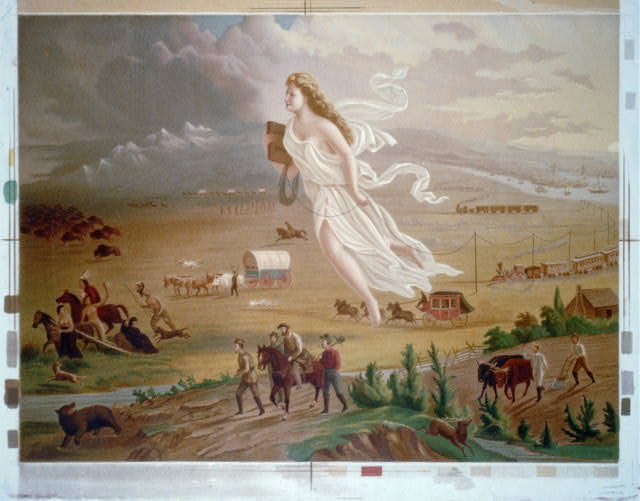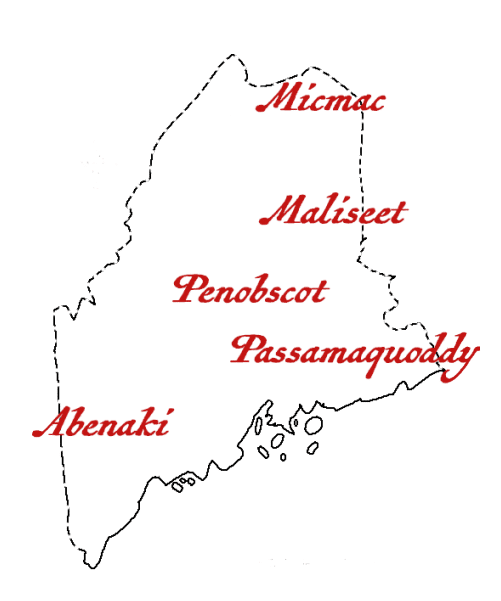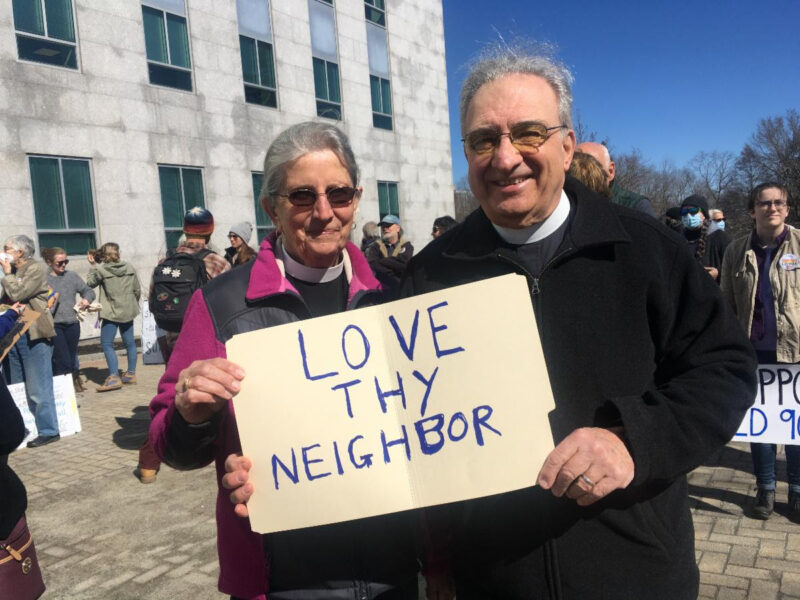Indigenous Relations
Our Mission
We are called by our Creator to deepen our relationship with the Wabanaki of Maine, to stand with the tribes in the pursuit of justice, to affirm their inherent sovereignty and to support the preservation of Native languages and culture.
Our Work
The Council of Indigenous Relations (CIR) began in 1991 as the Committee on Indian Relations, at the time of the quincentenary of the arrival of Columbus in the Caribbean, as Episcopalians in Maine desired to “get to know the Native American people of Maine; to learn about their histories, cultures, values, and yearnings, and join with them as we all share in the ministry of reaching out to all the people of Maine.”
We invite you to join us in our work and ongoing email discussion using the listerv service, Gaggle. Click the button below if you would like to be added to our group list.
Our History
Over the last 30 years, the committee has become a vibrant and diverse group with about 25 active members including clergy and laypeople representing most areas of the state. We work closely with other faith groups considering the same issues. The committee meets monthly to pray and learn together and to take actions to “stand with the tribes in the pursuit of justice, to affirm their inherent sovereignty and to support the preservation of Native language and cultures,” as stated in our Mission Statement. Working groups within the committee are “Legislative,” “Tribal Relations,” and “Communication.”


Doctrine of Christian Discovery and Domination
The Doctrine of Christian Discovery and Domination comprises the worldview, based on papal decrees beginning in the 1100s, that Christians have a right derived from God to invade non-Christian lands not claimed by other Christian nations and to seize the land and possessions of the non-Christian inhabitants. The doctrine further gives Christians the right to kill or enslave native inhabitants if they do not instantly submit to the representatives of the Christian sovereigns. This doctrine still impacts the laws of the United States today. John Dieffenbacher-Krall and CIR were integral in the renunciation of the Doctrine of Christian Discovery and Domination through resolutions in the Diocese of Maine in 2007 and the Episcopal Church General Convention in 2009. Since that time, the entire Anglican Communion, the World Council of Churches, and several other churches have followed suit.
Maine Indian Land Claims Settlement Act
 The inherent sovereignty of our Wabanaki neighbors is the first consideration of CIR. In 1972, the Passamaquoddy Tribe and the Penobscot Indian Nation compelled the Department of Justice to sue the Department of Interior on their behalf claiming they were entitled to their homelands that had been taken from them. The Maine Indian Claims Settlement of 1980 resolved the land claims of the three Tribes. But it also imposed limitations on Maliseet, Passamaquoddy, and Penobscot self-government not experienced by any other federally recognized tribe within the United States. The three Tribes have continually protested the injustice of the two acts since shortly after their enactment, and they have sought meaningful amendment of them through a variety of diplomatic and legal means, all of them thwarted.
The inherent sovereignty of our Wabanaki neighbors is the first consideration of CIR. In 1972, the Passamaquoddy Tribe and the Penobscot Indian Nation compelled the Department of Justice to sue the Department of Interior on their behalf claiming they were entitled to their homelands that had been taken from them. The Maine Indian Claims Settlement of 1980 resolved the land claims of the three Tribes. But it also imposed limitations on Maliseet, Passamaquoddy, and Penobscot self-government not experienced by any other federally recognized tribe within the United States. The three Tribes have continually protested the injustice of the two acts since shortly after their enactment, and they have sought meaningful amendment of them through a variety of diplomatic and legal means, all of them thwarted.
 Most recently, work was done in the Maine Legislature to amend the settlement act to make a more just relationship between the Tribes and the State. The Episcopal Diocese of Maine is part of a wide coalition of groups continuing to stand with Wabanaki people in this important work. Although LD 1626, “An Act To Implement the Recommendations of the Task Force on Changes to the Maine Indian Claims Settlement Implementing Act” did not pass in 2022, we will continue to press for full restoration and recognition of Wabanaki sovereignty. See “Wabanaki Nations Statement Regarding LD 1626” here.
Most recently, work was done in the Maine Legislature to amend the settlement act to make a more just relationship between the Tribes and the State. The Episcopal Diocese of Maine is part of a wide coalition of groups continuing to stand with Wabanaki people in this important work. Although LD 1626, “An Act To Implement the Recommendations of the Task Force on Changes to the Maine Indian Claims Settlement Implementing Act” did not pass in 2022, we will continue to press for full restoration and recognition of Wabanaki sovereignty. See “Wabanaki Nations Statement Regarding LD 1626” here.
Webinar Recording
Restoring Wabanaki Tribal Sovereignty
If you’d rather listen to the webinar, the audio is also available via the Episcopal Diocese of Maine’s Faith in Maine podcast. You can find that podcast episode anywhere you listen to podcasts (Apple, Spotify, PocketCasts, Google Podcasts, Pandora, etc.) or you can access it directly here.
Indigenous Peoples’ Day Service
In 2019, the state of Maine enacted legislation to replace Columbus Day with a celebration of Indigenous People. In October of 2020, the Diocese of Maine offered a Diocesan-wide worship service in celebration of Indigenous Peoples’ Day. Please feel free to share this service on any upcoming Indigenous Peoples Day.
The Gatherings: Reimagining Indigenous-Settler Relations
This book, written by Shirley Hagar of the Friends Committee on Maine Public Policy along with other Native and non-native participants in “the gatherings,” is the most recent topic of study and group discussion for committee members. From the 14 authors who speak in the book, we gain a deeper understanding of Indigenous-settler relations, how they came to be, the distrust and misconceptions that continue to make it difficult for us to communicate, and how those relations might be reimagined even now. In collaboration with the FCMPP, we presented key members of Maine state government with copies of the book and conversations about how the perception it provides might be used to improve relations between the State and the Tribal nations living within the boundaries of what is now called Maine.
“Invisible”
In 2005, CIR produced a documentary film “INVISIBLE,” which examines some of the history of the relations between the white and Indian communities in Maine. Through the voices of persons telling their stories, it looks at some of the underlying reasons for the racism so deeply embedded in white American culture and how that racism continues to shape Native American reality.
Matt Dunlap
Chair
Mary Beth DiMarco
Secretary
Rev. Jane White-Hassler
Treasurer
Rev. Lev Sherman
Chair, Communications Committee
John Maddaus
Chair, Legislative Committee
Territorial Acknowledgement
We acknowledge that we stand on territory that was taken from the Abenaki people of the Wabanaki Confederacy, the people of the Dawnland. May we always remember that the Earth does not belong to us, that we belong to the Earth, and that we are all companions in life. May we learn from our past sins and be instruments of justice and peace for all people in today’s world. We ask for inspiration that we might be compelled to take action and support our native neighbors as they continue to seek their sovereignty here in Maine. We also acknowledge that today we meet and worship on the lands of the Penobscot Nation. On behalf of the Committee on Indian Relations we would especially like to remember Butch Phillips today. He came to a convention in the 2010’s and did a smudging ceremony for us before our convention. His commitment to fostering relationships with everyone is a light to us all. May we continue to build those bonds of understanding.
Delivered by The Rev. Annette Joseph to the
THE 206TH CONVENTION OF THE EPISCOPAL DIOCESE OF MAINE | OCTOBER 25, 2025